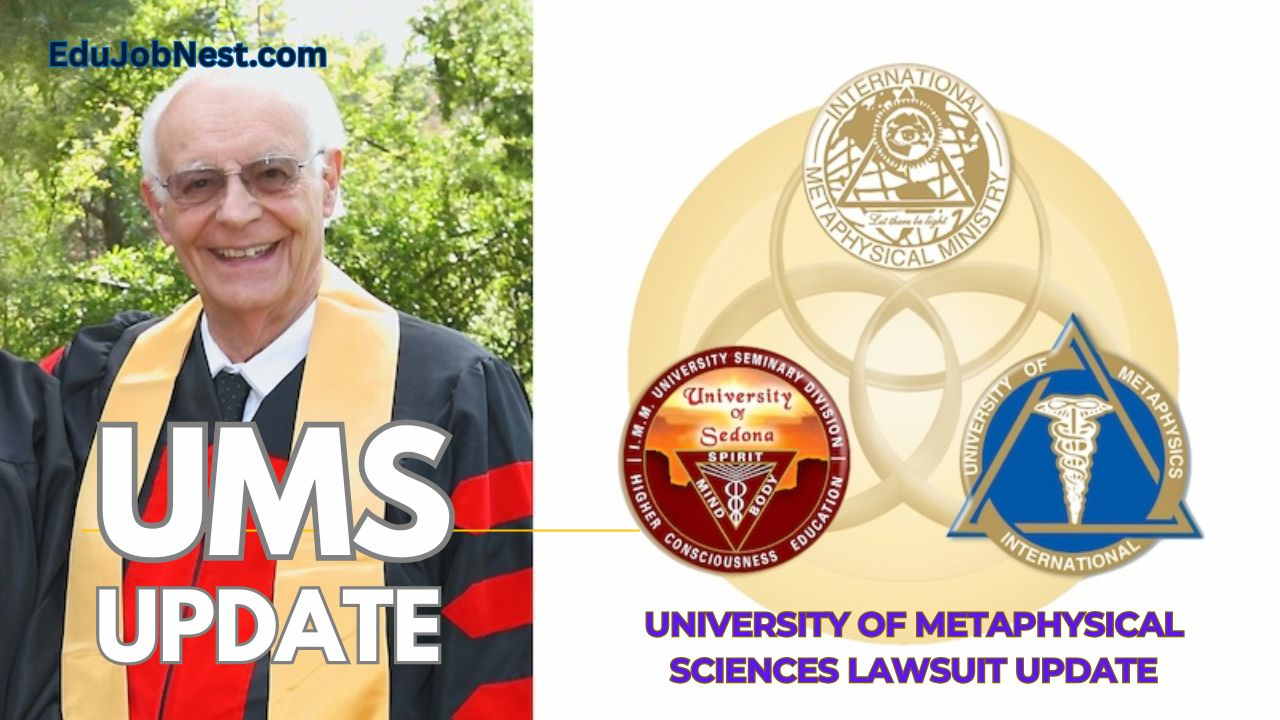
The University of Metaphysical Sciences (UMS) has been a cornerstone in spiritual education, offering courses in metaphysics, spiritual counseling, and holistic healing. However, its reputation has been under scrutiny due to a series of lawsuits that have sparked widespread discussion.
This article provides a comprehensive update on the University of Metaphysical Sciences lawsuit, diving into its origins, key developments, and implications for students, alumni, and the metaphysical community. As of May 12, 2025, the lawsuit has been dismissed, but the surrounding online narrative continues to raise questions.
Here’s everything you need to know about this legal saga, the truth behind the allegations, and what it means for those considering UMS for their spiritual education.
Also Read: Magadh University Admit Card 2025: Download UG/PG Hall Ticket
Background of the University of Metaphysical Sciences
Founded as a nonprofit under the Wisdom of the Heart Church, UMS operates primarily from Arcata, California, with programs accessible worldwide through its online platform. The institution offers bachelor’s, master’s, and doctoral degrees in metaphysical disciplines, focusing on spiritual growth, holistic health, and universal laws.
Unlike traditional universities, UMS operates as a religious-exempt institution, meaning it is not required to seek accreditation from bodies recognized by the U.S. Department of Education. Instead, it holds accreditation from spiritual organizations, which aligns with its mission to provide education for those pursuing careers in spiritual counseling, energy healing, or metaphysical teaching.
UMS has garnered a loyal following, with glowing reviews on platforms like Trustpilot, where students praise its transformative curriculum and supportive faculty. However, its non-traditional status has made it a target for legal challenges, particularly from competitors in the metaphysical education market.
The University of Metaphysical Sciences Lawsuit: What Was It About?
The most recent lawsuit, International Metaphysical Ministry vs. Wisdom of the Heart Church (Case №4:21-cv-08066-KAW), was dismissed on May 12, 2025, before reaching its scheduled trial from June 16–20, 2025.
This legal battle was the third in a series of lawsuits filed by a single competitor, the International Metaphysical Ministry (IMM), which operates the University of Metaphysics and University of Sedona in Sedona, Arizona.
The core allegation centered on deceptive advertising, specifically claims that UMS ran Google ads using IMM’s trademarked names to divert traffic to its own website.
UMS vehemently denied these accusations, providing Google AdWords reports to demonstrate it never used the competitor’s names in its campaigns. Instead, UMS alleged that the competitor may have run these ads themselves to frame UMS, pointing to a lack of evidence from the plaintiff and the presence of the competitor’s names on UMS’s negative keyword list, which prevents such ads from running. Both parties ultimately dropped their claims, resulting in a mutual dismissal, and no legal wrongdoing was established against UMS.
A History of Legal Challenges
This wasn’t the first time UMS faced legal action from the same competitor. Since 2017, IMM has initiated three lawsuits against UMS, none of which resulted in a victory for the plaintiff. These repeated legal efforts have been described by UMS and its supporters as “predatory litigation,” a tactic allegedly used to drain UMS’s resources and tarnish its reputation. According to UMS, the competitor spent an estimated $1.5 million on these lawsuits, while UMS remained financially stable, reporting profits even during litigation years.
The lawsuits have consistently revolved around advertising disputes, with no involvement from students, faculty, or government agencies like the Department of Justice, despite claims in some online articles. UMS maintains that its accreditation, business practices, tuition fees, and course quality were never part of the legal claims, and its degrees remain valid within the spiritual and metaphysical communities.
The Online Slander Campaign: Fake Articles and SEO Manipulation
Beyond the courtroom, UMS has faced a significant online challenge: a barrage of over 600 fake articles and spammed search terms aimed at damaging its reputation. Since November 6, 2024, these articles have flooded search results with misleading narratives, falsely claiming that the lawsuit involved issues like accreditation, degree validity, or student complaints.
Terms like “University of Metaphysical Sciences Sedona Arizona lawsuit” and “University of Metaphysical Sciences settlement” have been spammed in Google’s “People Also Search For” section, often leading to content farms hosting defamatory material.
UMS has actively fought back, filing DMCA takedown requests and reporting issues to Google, with some success in maintaining visibility for its official pages. The university suspects a competitor’s involvement in this negative SEO campaign, citing the organized nature of the attack and the use of black-hat SEO tactics. Some articles even pose risks to readers, allegedly containing viruses that could compromise personal data.
To address this, UMS is pursuing a John Doe petition to identify those responsible for the defamatory content. This legal action aims to secure court orders for Google and other search engines to remove fake articles and spammed search terms, with a discovery process to trace the perpetrators through website hosts and payment trails.
Implications for Students and the Metaphysical Community
For current and prospective UMS students, the dismissal of the lawsuit is reassuring. The university continues to operate without interruption, and its degrees remain recognized within spiritual and metaphysical fields. However, the controversy highlights several key considerations:
-
Understanding Accreditation: UMS’s religious-exempt status means its degrees are not recognized by traditional employers or regionally accredited institutions. They are, however, valued in spiritual markets for roles like spiritual counseling, reiki, or holistic healing. Students should align their expectations with their career goals, understanding the distinction between spiritual and secular accreditation.
-
Navigating Online Information: The proliferation of fake articles underscores the importance of verifying sources. UMS recommends relying on its official websites (metaphysicsuniversity.com and universityofmetaphysicalscienceslawsuit.com) or founder Christine Breese’s Medium account for accurate information.
-
The Cost of Predatory Litigation: The lawsuits against UMS reflect a broader issue in the business world, where competitors may use legal battles to undermine rivals. This case serves as a reminder for students to research institutions thoroughly and consider the motivations behind negative online narratives.
Also Read: Calicut University Previous Question Papers and Answers PDF: Your Ultimate Guide to Exam Success
What’s Next for UMS?
With the lawsuit dismissed, UMS is focusing on its mission to provide high-quality spiritual education. The university is enhancing its transparency by updating its website to clarify the nature of its degrees and accreditation. It also plans to continue its legal efforts against the online slander campaign, aiming to protect its reputation and ensure accurate information reaches prospective students.
For the metaphysical community, this case highlights the growing pains of alternative education. As interest in spiritual and holistic studies rises, institutions like UMS must balance innovation with clear communication to maintain trust. The dismissal of the lawsuit reinforces UMS’s resilience, but the ongoing battle against misinformation underscores the need for vigilance in the digital age.
Lessons Learned from the UMS Lawsuit
The University of Metaphysical Sciences lawsuit offers valuable takeaways for students, educators, and the broader spiritual community:
-
Verify Sources: Not all online content is trustworthy. Check primary sources, such as official university websites or verified reviews, before forming opinions.
-
Understand Accreditation Limits: Degrees from religious-exempt institutions like UMS are tailored for spiritual careers, not traditional academic or professional settings.
-
Beware of Predatory Tactics: Legal and online attacks can be used to harm competitors. Recognizing these tactics can help consumers make informed decisions.
Conclusion
The University of Metaphysical Sciences lawsuit, dismissed on May 12, 2025, was a high-profile case that spotlighted the challenges of operating in the alternative education space. While UMS emerged unscathed, the surrounding online slander campaign continues to pose challenges. For students and spiritual seekers, the key is to approach such institutions with clear expectations and a critical eye toward online information. UMS remains a respected name in metaphysical education, and its commitment to its students and mission is unwavering.
For more details, visit the University of Metaphysical Sciences official website or read student reviews on Trustpilot. To learn more about predatory litigation, check out this article on business litigation abuses.




3 thoughts on “University of Metaphysical Sciences Lawsuit Update: What You Need to Know in 2025”